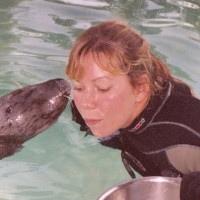Jessica Stella
PhD candidate
James Cook University

From 2005 to 2022, the main node of the ARC Centre of Excellence for Coral Reef Studies was headquartered at James Cook University in Townsville, Queensland (Australia)








Jessica grew up near Boston in the USA and became passionate about marine science after she began diving in the chilly waters of the Eastern US. She spent a year living in Bermuda undertaking a double internship as an aquarist for the Bermuda Aquarium, Museum and Zoo and conducting seagrass and coral baseline surveys as part of the BREAM Programme with the Bermuda Zoological Society. She also volunteered with the Bermuda Turtle Project tagging and collecting DNA from juvenile green turtles. She then moved to Townsville to complete a BSc (Honours) at JCU in 2008 and began her PhD under the supervision of Prof. Geoffrey Jones, Dr. Morgan Pratchett and Dr. Philip Munday from JCU, and collaborations with Dr. Pat Hutchings of the Australian Museum and Dr. Elvira Poloczanska of CSIRO. Her research aims to expand our taxonomic knowledge of reef invertebrate species, examine the level of habitat specialisation exhibited by many coral associated invertebrates and also to determine ! the effects that climate change may have on invertebrate biodiversity.
New DNA techniques are being used to understand how coral reacted to the end of the last ice age in order to better predict how they will cope with current changes to the climate. James Cook Univer
A new study on the effects of climate change in five tropical countries has found fisheries are in more trouble than agriculture, and poor people are in the most danger. Distinguished Profess
James Cook University researchers have found brightly coloured fish are becoming increasingly rare as coral declines, with the phenomenon likely to get worse in the future. Christopher Hemingson, a
Researchers working with stakeholders in the Great Barrier Reef region have come up with ideas on how groups responsible for looking after the reef can operate more effectively when the next bleaching
Abstract: As marine species adapt to climate change, their heat tolerance will likely be under strong selection. Individual variation in heat tolerance and its heritability underpin the potential fo
Abstract: The Reef Ecology Lab in KAUST’s Red Sea Research Center explores many aspects of movement ecology of marine organisms, ranging from adult migrations to intergenerational larval dispersal
Abstract: Macroalgal meadows are a prominent, yet often maligned component of the tropical seascape. Our work at Ningaloo reef in WA demonstrate that canopy forming macroalgae provide habitat for ad
Abstract: Sharks are generally perceived as strong and fearsome animals. With fossils dating back at least 420 million years, sharks are not only majestic top predators but they also outlived dinosa
Abstract: Connectivity plays a vital role in many ecosystems through its effects on fundamental ecological and evolutionary processes. Its consequences for populations and metapopulations have been
Abstract: Evolution of many eukaryotic organisms is affected by interactions with microbes. Microbial symbioses can ultimately reflect host’s diet, habitat range, and even body shape. However, how
Abstract: The past few years have seen unprecedented coral bleaching and mortality on the Great Barrier Reef (GBR) but the consequences of this on biodiversity are not yet known. This talk will expl